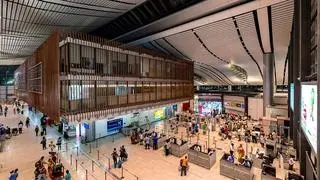The Rail Board has approved a proposal allowing Container Corporation (CONCOR) to run container trains to the Bangladeshi capital of Dhaka. This is part of a bilateral initiative to reduce logistics cost which is hindering trade growth.
Bangladesh is ninth-largest importer of Indian goods. However, exports have been falling over the last three years.
According to trade statistics published by the Indian High Commission in Dhaka, Indian exports to its eastern neighbour touched $6 billion in 2013-14 (July to June), up from $4.77 billion in the previous year. Exports declined to $5.8 billion and $5.4 billion respectively In 2014-15 and 2015-16 and; stood at $4.3 billion during July 2016 and March 2017.
Bangladeshi exports to India — though much smaller in comparison — steadily grew from $456 million to $689 million between 2013-14 and 2015-16.
The current trade logistics between India and Bangladesh is largely road-based and non-containerised. This, coupled with restrictions on vehicle movement between the two nations and axel-load restrictions in Bangladesh, leads to manual loading and unloading in the border, increasing both congestion and trade cost.
According to a BusinessLine report, the congestion at the Petrapole-Benapole border (which alone handles more than half the bilateral trade) costs two per cent on a average consignment value of ₹1 crore.
Rail movement is the ideal solution to reducing trade costs. The two countries have three operational rail links. Passenger trains move between Kolkata and Dhaka through the Gede-Darshana line.
However, load restrictions on Jamuna bridge, over the Padma, currently stalls movement of goods trains.
The problem is expected to be resolved once the new Padma bridge is operational. However, considering that the associated rail infrastructure might take a longer time to be in place, India and Bangladesh are exploring the technical feasibility of running container trains at lower-than-optimal load at slow pace.







Comments
Comments have to be in English, and in full sentences. They cannot be abusive or personal. Please abide by our community guidelines for posting your comments.
We have migrated to a new commenting platform. If you are already a registered user of TheHindu Businessline and logged in, you may continue to engage with our articles. If you do not have an account please register and login to post comments. Users can access their older comments by logging into their accounts on Vuukle.